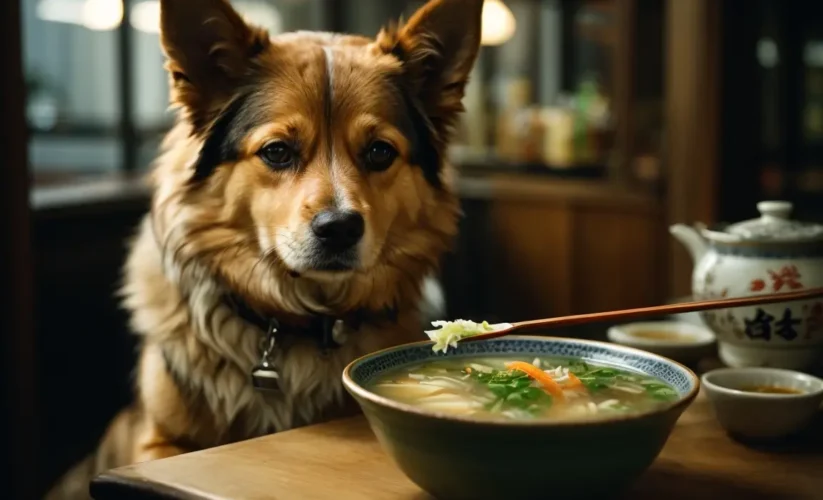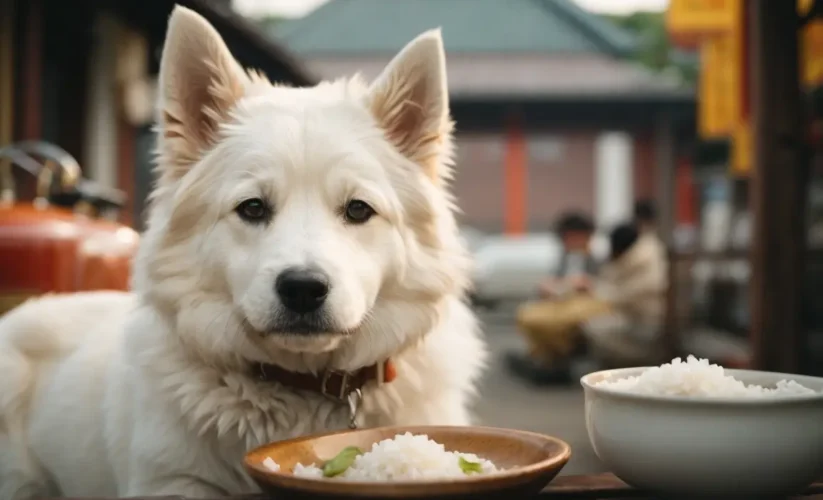Can dogs eat miso soup?

Welcome to the world of dog care, where every bite and sip your furry friend takes matters. As a devoted dog parent, I understand the constant quest to ensure our pets are healthy and happy. Today, we delve into a common query that puzzles many dog owners: Can dogs eat miso soup? This traditional Japanese dish, known for its savory umami flavor, has made its way into kitchens worldwide. But is it suitable for our canine companions? Understanding the impact of human foods like miso soup on our pets is crucial. It’s not just about what they can eat; it’s about what they should eat for optimal health. This comprehensive guide aims to address your concerns, backed by thorough research and vet consultations. We’ll explore the benefits and risks of miso soup for dogs, consider alternatives, and conclude with well-rounded advice. Whether you’re a seasoned dog owner or new to the pet parenting world, this article will equip you with the knowledge to make informed decisions about your dog’s diet. Let’s dive in and uncover the truth about dogs and miso soup.
Is Miso Soup Good for Dogs?
At first glance, miso soup seems like a harmless treat for dogs. Miso, a fermented soybean paste, is rich in protein and contains a range of vitamins and minerals. However, we must consider the entire composition of the soup. Miso soup typically contains seaweed, tofu, and occasionally vegetables, all of which can be beneficial in moderation. Seaweed, for instance, is a great source of iodine and fiber. Tofu, being a soy product, offers a plant-based protein alternative.
But the catch lies in the preparation. Miso itself is high in sodium, which can be detrimental to dogs in large quantities. While a small amount of sodium is essential for your pet’s health, excessive intake can lead to dehydration, increased blood pressure, and even sodium ion poisoning. Moreover, the fermentation process of miso produces alcohol as a byproduct, which is toxic to dogs.
There’s also the question of ingredients added to the soup. Traditional miso soup often includes dashi, a broth made from fish or kelp, which can be too rich for a dog’s digestive system. Additionally, onions and garlic, common in many recipes, are toxic to dogs. Even small amounts can lead to gastrointestinal irritation and red blood cell damage.
In conclusion, while certain components of miso soup can offer nutritional benefits, the overall dish may not be the safest choice for your dog. The high sodium content and potential inclusion of harmful ingredients outweigh the possible benefits. As responsible pet owners, we should be cautious about introducing such foods into our dog’s diet.
Is Miso Soup Bad for Dogs?
Diving deeper into the potential hazards, miso soup poses several risks to canine health. The primary concern is the high sodium content. Dogs have a much lower tolerance for sodium than humans. Their bodies aren’t equipped to handle large amounts of salt, which is prevalent in miso. Excessive salt intake in dogs can lead to sodium ion poisoning, characterized by symptoms like vomiting, diarrhea, excessive thirst, and urination. In severe cases, it can cause tremors, seizures, and even death.
Another risk factor is the presence of ingredients toxic to dogs. Onions and garlic, often found in miso soup, can cause gastrointestinal upset and, more seriously, damage to red blood cells, leading to anemia. These ingredients are toxic in any form – raw, cooked, or powdered.
Furthermore, the ingredients in dashi, a common base for miso soup, can vary. Some recipes include bonito flakes (dried fish) or kelp, which in moderation could be harmless but in excess might lead to stomach upset or an imbalanced diet. Certain types of fish used in dashi may also contain bones, posing a choking hazard or causing internal blockages.
It’s also worth considering the impact of processed foods on a dog’s health. Miso soup, particularly store-bought or restaurant-prepared versions, might contain preservatives, additives, and flavor enhancers like MSG, which are not recommended for dogs. These additives can lead to adverse reactions and long-term health issues.
Given these risks, it’s evident that miso soup, while not outright toxic, isn’t an ideal choice for dogs. The potential health hazards associated with its ingredients and high sodium content make it a risky addition to a dog’s diet.
Are Other Soups Safe For Dogs?
When considering soups for dogs, it’s essential to understand that not all soups are created equal. Many human soups are laden with ingredients that are unhealthy or even dangerous for dogs. However, there are safe and nutritious alternatives.
Homemade broths, such as chicken or beef broth, can be excellent choices for dogs. They provide hydration and can be especially beneficial for dogs with appetite loss. Ensure these broths are made without onions, garlic, and excessive salt. It’s best to avoid store-bought broths, which often contain additives and high sodium levels.
Vegetable soups can also be a good option, provided they contain dog-safe vegetables. Carrots, green beans, and pumpkin are great choices, offering vitamins, fiber, and hydration. Again, caution is needed to ensure no harmful ingredients like onions or excessive spices are included.
Bone broth is another healthy alternative. Rich in nutrients, it supports joint health, digestion, and the immune system. Homemade bone broth, simmered for an extended period to extract nutrients from the bones, is best. However, bones should never be given to dogs, as they can splinter and cause internal injuries.
In summary, while miso soup and many commercial soups are not recommended for dogs, there are safe alternatives. Homemade broths and vegetable soups, free from harmful ingredients, can offer health benefits and serve as a tasty treat for your canine friend.
Final Thoughts
In conclusion, while miso soup is a beloved dish among humans, its suitability for dogs is questionable. The high sodium content and potential inclusion of toxic ingredients like onions and garlic make it a less than ideal choice for our canine companions. As responsible pet owners, our priority should always be the health and wellbeing of our furry friends.
That said, there are numerous dog-friendly alternatives that can provide hydration and nutritional benefits. Homemade broths and certain vegetable soups, made with dog-safe ingredients, can be a healthy addition to your dog’s diet. It’s essential to be mindful of the ingredients and preparation methods to ensure the safety and health of your pet.
Always consult with your veterinarian before introducing new foods into your dog’s diet, especially if they have existing health conditions or dietary restrictions. Remember, what’s good for humans isn’t always good for dogs. By making informed decisions about our pets’ diet, we can ensure they lead a happy, healthy, and fulfilling life.










